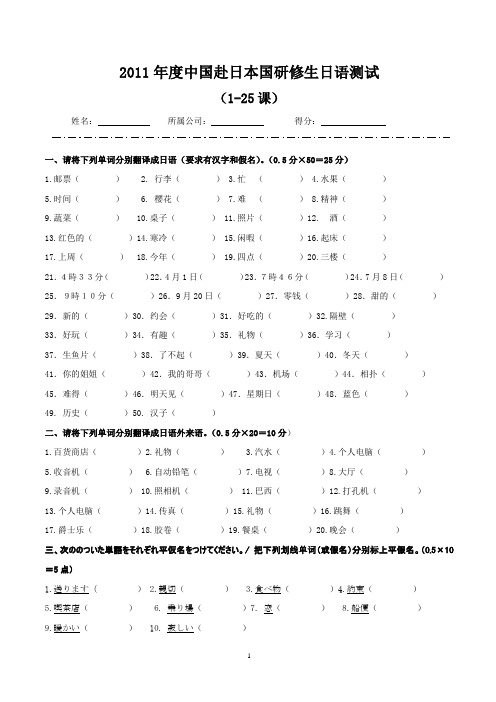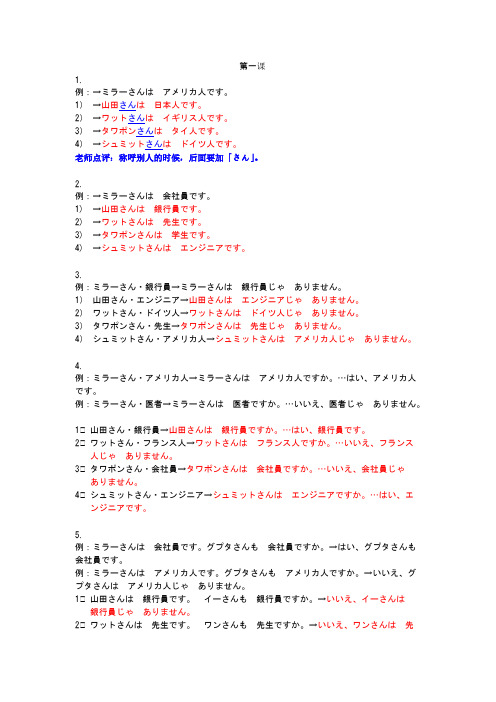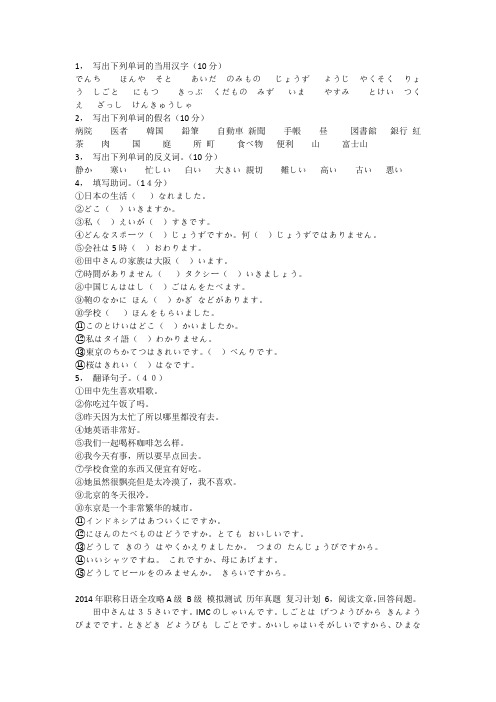大家日本语课后测试1 附答案
- 格式:doc
- 大小:22.50 KB
- 文档页数:3

2011年度中国赴日本国研修生日语测试(1-25课)姓名:所属公司:得分:一、请将下列单词分别翻译成日语(要求有汉字和假名)。
(0.5分×50=25分)1.邮票()2. 行李()3.忙()4.水果()5.时间()6. 樱花()7.难()8.精神()9.蔬菜() 10.桌子() 11.照片()12. 酒()13.红色的()14.寒冷() 15.闲暇()16.起床()17.上周() 18.今年() 19.四点()20.三楼()21.4時33分()22.4月1日()23.7時46分()24.7月8日()25.9時10分()26.9月20日()27.零钱()28.甜的()29.新的()30.约会()31.好吃的()32.隔壁()33.好玩()34.有趣()35.礼物()36.学习()37.生鱼片()38.了不起()39.夏天()40.冬天()41.你的姐姐()42.我的哥哥()43.机场()44.相扑()45.难得()46.明天见()47.星期日()48.蓝色()49.历史()50.汉子()二、请将下列单词分别翻译成日语外来语。
(0.5分×20=10分)1.百货商店()2.礼物()3.汽水()4.个人电脑()5.收音机()6.自动铅笔()7.电视()8.大厅()9.录音机() 10.照相机() 11.巴西()12.打孔机()13.个人电脑()14.传真()15.礼物()16.跳舞()17.爵士乐()18.胶卷()19.餐桌()20.晚会()三、次ののついた単語をそれぞれ平仮名をつけてください。
/ 把下列划线单词(或假名)分别标上平假名。
(0.5×10=5点)1.送ります()2.親切()3.食べ物()4.約束()5.喫茶店()6. 乗り場()7. 窓()8.船便()9.暖かい()10. 寂しい()四、次ののついた単語の平仮名をそれぞれ日本の当用漢字に直してください。
/ 把下列划线的平假名分别标上日语当用汉字(或假名)。

《大家的日语1》第一课测试练习卷《大家的日语》第1課はじめましてテストI.単語(日中対訳)我<名> ________________________先生、女士、同志<接尾> ________________学生<名> ________________________公司职员<名> ________________________你,您<名> ________________________是、对<感> ________________________不、不是<感> ________________________银行职员<名> ________________________医生<名> ________________________ 他、她、那个人<名> ______________________哪位<名> ________________________大学<名> ________________________樱花大学<名> ________________________老师<名> ________________________代替<接尾> ________________________几岁<名> ________________________9<数> ________________________一岁<助数> ________________________美国<名> ________________________中国<名> ________________________~人<接尾> ________________________中国人<名> ________________________教师<名> ________________________他、她、那个人<名> ______________________谁<名> ________________________IMC公司<名> ________________________公司的职员<名> ________________________富士大学<名> ________________________巴西<名> ________________________8岁<助数> ________________________多大岁数<名> ________________________日本<名> ________________________英国<名> ________________________泰国<名> ________________________德国<名> ________________________亚洲研究中心<名> ______________________研究人员<名> ________________________神户<名> ________________________ 医院<名> ________________________神户医院<名> ________________________巴西航空<名> ________________________印度<名> ________________________韩国<名> ________________________印度尼西亚<名> ________________________动力电气公司<名> ______________________ ------------------------------------------------------------------------------------------- II. <練習C>初次见面。

第一课1.例:→ミラーさんは アメリカ人です。
1)→山田さんは 日本人です。
2)→ワットさんは イギリス人です。
3)→タワポンさんは タイ人です。
4)→シュミットさんは ドイツ人です。
老师点评:称呼别人的时候,后面要加「さん」。
2.例:→ミラーさんは 会社員です。
1)→山田さんは 銀行員です。
2)→ワットさんは 先生です。
3)→タワポンさんは 学生です。
4)→シュミットさんは エンジニアです。
3.例:ミラーさん・銀行員→ミラーさんは 銀行員じゃ ありません。
1)山田さん・エンジニア→山田さんは エンジニアじゃ ありません。
2)ワットさん・ドイツ人→ワットさんは ドイツ人じゃ ありません。
3)タワポンさん・先生→タワポンさんは 先生じゃ ありません。
4)シュミットさん・アメリカ人→シュミットさんは アメリカ人じゃ ありません。
4.例:ミラーさん・アメリカ人→ミラーさんは アメリカ人ですか。
…はい、アメリカ人です。
例:ミラーさん・医者→ミラーさんは 医者ですか。
…いいえ、医者じゃ ありません。
1、山田さん・銀行員→山田さんは 銀行員ですか。
…はい、銀行員です。
2、ワットさん・フランス人→ワットさんは フランス人ですか。
…いいえ、フランス人じゃ ありません。
3、タワポンさん・会社員→タワポンさんは 会社員ですか。
…いいえ、会社員じゃ ありません。
4、シュミットさん・エンジニア→シュミットさんは エンジニアですか。
…はい、エンジニアです。
5.例:ミラーさんは 会社員です。
グプタさんも 会社員ですか。
→はい、グプタさんも 会社員です。
例:ミラーさんは アメリカ人です。
グプタさんも アメリカ人ですか。
→いいえ、グプタさんは アメリカ人じゃ ありません。
1、山田さんは 銀行員です。
イーさんも 銀行員ですか。
→いいえ、イーさんは 銀行員じゃ ありません。
2、ワットさんは 先生です。
ワンさんも 先生ですか。
→いいえ、ワンさんは 先生じゃ ありません。

练习题一、写出下列单词的假名病院()医者()韓国()鉛筆()自動車()新聞()手帳()昼()図書館()二、写出些列单词的汉字A. わたしはちゅうごくじんです。
わたし1私2我3汝ちゅうごく1韓国2中国3日本B.これはにほんのりんごです。
にほん1日木2日記3日本C.ぎんこうは10じから3じまでです。
ぎんこう1金庫2銀行3銀校じ1時2字3分D.けさなにもたべませんでした。
けさ1朝2今朝3明日E.まいにちしんぶんをよみます。
まいにち1毎週2毎日3一日しんぶん1新聞2報紙3雑誌F.ほんやはぎんこうのとなりにあります。
ほんや1書屋2本屋3本店となり1隣2左3前三、词语排列成句子例:受付/か/です/は/どこ…受付はどこですか。
1は/会社/か/ヨーネン/の/です/何2.チョコレート/です/会社/の/ヨーネン/は3.かばん/この/か/は/いくら/です4.エレベーター/どちら/です/は/か四、回答问题1.うちはどこですか。
2.あなたの部屋は1階ですか。
3.あなたの時計は日本のですか。
4.あなたの日本語の本はいくらですか。
五、选择正确的选项(1)カメラの売り場は___です。
(うりば)一階①いっかい②いちかい③いっがい④いちがい(2)-このコートはいくらですか。
-___円です。
①ごせんはっぴゃく②ごぜんはっぴゃく③ごせんはっびゃく④ごぜんはっびゃく(3)___は図書館です。
①これ②ここ③この④どれ(4)____は英語の雑誌です。
①どれ②これ③あの④この(5)日本語の教室は____ですか。
①どの②どこ③何④だれ(6)____デジカメはいくらですか。
①あの②あれ③あそこ④これ(7)このラジオは___ですか。
①いくら②だれ③どこ④何(8)-その英語の辞書は__のですか。
-わたしのです。
①何②だれ③どれ④わたし(9)デパートは___建物ですか。
①どれ②何③どこ④どの(10)吉田さんは___人ですか。
①どれ②どこ③どの④だれ(11)-あそこは学校ですか。

1,写出下列单词的当用汉字(10分)でんちほんやそとあいだのみものじょうずようじやくそくりょうしごとにもつきっぷくだものみずいまやすみとけいつくえざっしけんきゅうしゃ2,写出下列单词的假名(10分)病院医者韓国鉛筆自動車新聞手帳昼図書館銀行紅茶肉国庭所町食べ物便利山富士山3,写出下列单词的反义词。
(10分)静か寒い忙しい白い大きい親切難しい高い古い悪い4,填写助词。
(14分)①日本の生活()なれました。
②どこ()いきますか。
③私()えいが()すきです。
④どんなスポーツ()じょうずですか。
何()じょうずではありません。
⑤会社は5時()おわります。
⑥田中さんの家族は大阪()います。
⑦時間がありません()タクシー()いきましょう。
⑧中国じんははし()ごはんをたべます。
⑨鞄のなかにほん()かぎなどがあります。
⑩学校()ほんをもらいました。
⑪このとけいはどこ()かいましたか。
⑫私はタイ語()わかりません。
⑬東京のちかてつはきれいです。
()べんりです。
⑭桜はきれい()はなです。
5,翻译句子。
(40)①田中先生喜欢唱歌。
②你吃过午饭了吗。
③昨天因为太忙了所以哪里都没有去。
④她英语非常好。
⑤我们一起喝杯咖啡怎么样。
⑥我今天有事,所以要早点回去。
⑦学校食堂的东西又便宜有好吃。
⑧她虽然很飘亮但是太冷漠了,我不喜欢。
⑨北京的冬天很冷。
⑩东京是一个非常繁华的城市。
⑪インドネシアはあついくにですか。
⑫にほんのたべものはどうですか。
とてもおいしいです。
⑬どうしてきのうはやくかえりましたか。
つまのたんじょうびですから。
⑭いいシャツですね。
これですか、母にあげます。
⑮どうしてビールをのみませんか。
きらいですから。
2014年职称日语全攻略A级B级模拟测试历年真题复习计划6,阅读文章,回答问题。
田中さんは35さいです。
IMCのしゃいんです。
しごとはげつようびからきんようびまでです。
ときどきどようびもしごとです。
かいしゃはいそがしいですから、ひまなじかんがあまりありませんが、かいしゃのひとはとてもしんせつですから、このしごとがすきです。

练习题一、写出下列单词的假名病院()医者()韩国()铅笔()自动车()新闻()手帐()昼()図书馆()二、写出些列单词的汉字A.わたしはちゅうごくじんです。
わたし1私2我3汝ちゅうごく1韩国2中国3日本B.これはにほんのりんごです。
にほん1日木2日记3日本C.ぎんこうは10じから3じまでです。
ぎんこう1金库2银行3银校じ1时2字3分D.けさなにもたべませんでした。
けさ1朝2今朝3明日E.まいにちしんぶんをよみます。
まいにち1毎周2毎日3一日しんぶん1新闻2报纸3雑志F.ほんやはぎんこうのとなりにあります。
ほんや1书屋2本屋3本店となり1隣2左3前三、词语排列成句子例:受付/か/です/は/どこ…受付はどこですか。
1は/会社/か/ヨーネン/の/です/何2.チョコレート/です/会社/の/ヨーネン/は3.かばん/この/か/は/いくら/です4.エレベーター/どちら/です/は/か四、回答问题1.うちはどこですか。
2.あなたの部屋は1阶ですか。
3.あなたの时计は日本のですか。
4.あなたの日本语の本はいくらですか。
五、选择正确的选项(1)カメラの売り场は___です。
(うりば)一阶①いっかい②いちかい③いっがい④いちがい(2)-このコートはいくらですか。
-___円です。
①ごせんはっぴゃく②ごぜんはっぴゃく③ごせんはっびゃく④ごぜんはっびゃく(3)___は図书馆です。
①これ②ここ③この④どれ(4)____は英语の雑志です。
①どれ②これ③あの④この(5)日本语の教室は____ですか。
①どの②どこ③何④だれ(6)____デジカメはいくらですか。
①あの②あれ③あそこ④これ(7)このラジオは___ですか。
①いくら②だれ③どこ④何(8)-その英语の辞书は__のですか。
-わたしのです。
①何②だれ③どれ④わたし(9)デパートは___建物ですか。
①どれ②何③どこ④どの(10)吉田さんは___人ですか。
①どれ②どこ③どの④だれ(11)-あそこは学校ですか。

Lesson 4 the Trial That Rocked the World1. "Don't worry; son; we'll show them a few tricks."2. The case had erupted round my head...3. ... no one; least of all I; anticipated that my case would snowball into one of the most famous trials in U. S. History.4. "That's one hell of a jury"5. "Today it is the teachers; "he continued; "and tomorrow the magazines; the books; the newspapers.6. "There is some doubt about that;" Darrow snorted.7. ... accused Bryan of calling for a duel to the death between science and religion.8. Spectators paid to gaze at it and ponder whether they might be related.9. Now Darrow sprang his trump card by calling Bryan as a witness for the defense.10. My heart went out to the old warrior as spectator s pushed by him to shake Darrow's hand.1. “Don’t worry; young man; we have some clever and unexpected tactics and we will surprise them in the trial.”2. The case had come down upon me unexpectedly and violently;3. I was the last one to expect that my case would become one of the most famous trials in U.S. History.4. The jury is a completely inappropriate.5. Today the teachers are put on trial because they teach scientific theory; soon the newspapers and magazines will not be allowed to spread knowledge of science.6. “It is doubtful whether man has reasoning power;” said Darrow sarcastically and scornfully.7. ... accused Bryan of demanding that a life or death struggle be fought between science and religion.8. People had to pay in order to have a look at the ape and to consider carefully whether apes and humans could have a common ancestry.9. Darrow surprised everyone by asking for Bryan as a witness for Scopes which was a brilliant idea.10. I felt sorry for Bryan as the spectators rushed past him to congratulate Darrow.Unit 6 Mark Twain --- Mirror of America1. Mark Twain is known to most Americans as the author of The Adventures ofTom Sawyer and The Adventures of Huckleberry Finn. Huck Finn is noted for his simple and pleasant journey through his boyhood which seems eternal and Tom Sawyer is famous for his free roam of the country and his adventure in one summer which seems never to end.2. His work on the boat made it possible for him to meet a large variety of people. It is a world of all types of characters.3. All would reappear in his books; written in the colorful language that he seemed to be able to remember and record as accurately as a phonograph.4. Steamboat decks were filled with people of pioneering spirit and also lawless people or social outcasts such as hustlers; gamblers and thugs.5. He went west to Nevada by a horse-pulled public vehicle; following the flow of people in the gold and silver rush.6. Mark Twain began to work hard as a newspaper reporter and humorist to become well-known locally.7. Those who came pioneering out west were energetic; courageous and reckless people; because those who stayed at home were the slow; dull and lazy people.8. That’s typical of California.9. If we relaxed; rested or stayed away from all this crazy struggle for success occasionally and kept the daring and enterprising spirit; we would be able to remain strong and healthy and continue to produce great thinkers.10. At the end of his life; he lost the last bit of his positive view of man and the world.Unit 9 “A More Perfect Union”The document they produced was eventually signed but ultimately unfinished.P1: After heated debate and compromises; the Constitution was finally adopted by the Constitutional Convention and 39 out of 55 delegates signed the document. But the “three-fifths” clause and the twenty years allowed for the slave trade showed the slave issue was not solved; so the process of forming a more perfect union did not end with the enforcement of the Constitution.But it also comes from my own story.P2: My personal background and my success story; rising from rags to riches; alsoteaches me the importance of unity.But it is a story that has seared into my genetic makeup the idea that this nation is more than the sum of its part-that out of many; we are truly one.P3: I am deeply ingrained; through my experience in the United States; with the idea that America is not a total of adding everything together but is the product of fusion; of sharing the same creed.Throughout the first year of this campaign; against all predictions to the contrary; we saw how hungry the American people were for this message of unity.P4: In spite of all announcements that America was not ready for a black president; that I would fail in the campaign; we gained momentum in the first year of the campaign; which showed that the American people demanded unity and change. Despite the temptation to view my candidacy through a purely racial lens; we won commanding victories in states with some of the whitest populations in the country. P5: People were encouraged to judge me from the perspective of a black candidate; raising the question of whether the United State would fare better with a black president. However; we won great victories even in some of the more conservative states; with stronger racial bias.We saw racial tensions bubble to the surface during the week before the South Carolina primary.P6: The week before the Democrats were to select their delegates to the national convention in South Carolina; attacks on me; on blacks became more frequent; more intense.On one end of the spectrum; we’ve heard the implication that my candidacy is somehow an exercise in affirmative action; that it’s based solely on desire of wide-eyed liberals to purchase racial reconciliation on the cheap.P7: At one end of the entire range of opinion; there are people who say that I decided to run because I wanted to show black and white should have equal opportunity and I wanted to play on the desires of na ve liberals to achieve racial harmony without making great effort.I can no more disown him than I can disown the black community.P8: It is impossible for me to cast him off just as it is impossible for me to repudiate the black community.Unit 1 Pub Talk and the King's English1. And it is an activity only of humans. para 1并且它是人类特有的一种活动..1.And conversation is an activity which is found only among human being.2. Conversation is not for making a point. para 2交谈并不是为了表明一种看法..2.Conversation is not for persuading others to accept our idea or point of view.3. In fact; the best conversationalists are those who are prepared to lose. para 2实际上;最好的交谈者;是那些准备输的人..3.In fact a person who really enjoys and is skilled at conversation will not argue to win or force others to accept his point of view.4. Bar friends are not deeply involved in each other's lives. para 3酒吧友人没有深层次地涉及彼此的生活..4.People who meet each other for a drink in the bar of a pub are not intimate friends for they are not deeply absorbed or engrossed in each other’s lives.5. it could still go ignorantly on para 6大伙仍旧可以糊里糊涂地扯下去..5. The conversation could go on without anybody knowing who was right or wrong.6. They are cattle in the fields; but we sit down to beef boeuf. para 9地里放牧着的牛叫cattle;席上吃的牛肉则叫beef..6.These animals are called cattle when they are alive and feeding in the fields;but when we sit down at the table to eat.we call their meat beef.7. The new ruling class had built a cultural barrier against him by building their French against his own language. para11新的统治阶级用法语来对抗其他语言;这样就建立起了对抗这些农民的文化壁垒..7. The new ruling class by using French instead of English made it difficult for the English to accept or absorb the culture of the rulers.8. English had come royally into its own. para 13英语取得了国语的地位..8.The English language received proper recognition and was used by the King once more.9. The phrase has always been used a little pejoratively and even facetiously by the lower classes. para 15下层阶级使用这个短语时;常带有贬义;甚至讥讽的味道..9.The phrase;the King’s English;has always been used disre spectfully and jokingly by the lower classesor: The working people very often make fun of the proper and formal language of the educated people.10. The rebellion against a cultural dominance is still there. para 15对文化支配的对抗仍然存在..10.There still exists in the working people;as in the early Saxon peasants;a spirit of opposition to the cultural authority of the ruling class.11. There is always a great danger; as Carlyle put it; that "words will harden into things for us. " para 16正如卡莱尔提出的;“对我们而言;词语会变成具体的事物”;这始终会有极大的危险.. 11. There is always a great danger that we might forget that words are only symbols and take them for things they are supposed to represent.For example;the word “dog” is a symbol representing a kind of animal.We mustn’t regard the word “dog” as being the animal itself.Lesson 2 Marrakech1. The burying-ground is merely a huge waste of hummocky earth; like a derelict building-lot.2. All colonial empires are in reality founded upon that fact.3. They rise out Of the earth; they sweat and starve for a few years; and then they sink back into the nameless mounds of the graveyard para 34. A carpenter sits cross legged at a prehistoric lathe; turning chair-legs at lightning speed.5. Instantly; from the dark holes all round; there was a frenzied rush of Jews.6. every one of them looks on a cigarette as a more or less impossible luxury7. Still; a white skin is always fairly conspicuous. para 168. In a tropical landscape one's eye takes in everything except the human beings.9. No one would think of running cheap trips to the Distressed Areas.10. for nine-tenths of the people the reality of life is an endless; backbreaking struggle to wring a little food out of an eroded soil para 1711. She accepted her status as an old woman; that is to say as a beast of burden.12. People with brown skins are next door to invisible. para 2113. Their splendid bodies were hidden in reach-me-down khaki uniforms14. How long before they turn their guns in the other direction para 2515. Every white man there had this thought stowed somewhere or other in his mind.1.The burying-ground is nothing more than a huge piece of wasteland full of mounds of earth looking like a deserted and abandoned piece of land on which a building was going to be put up.2. All the imperialists build up their empires by treating the people in the colonies like animals by not treating the people in the colonies as human beings.3. They are born. Then for a few years they work; toil and starve. Finally they die and are buried in graves without a name.4. Sitting with his legs crossed and using a very old-fashioned lathe; a carpenter quickly gives a round shape to the chair-legs he is making.5. Immediately from their dark hole-like cells everywhere a great number of Jews rushed out wildly excited.6. Every one of these poor Jews looked on the cigarette as a piece of luxury which they could not possibly afford.7. However; a white-skinned European is always quite noticeable.8. If you take a look at the natural scenery in a tropical region; you see everything but the human beings.9. No one would think of running cheap trips to the Distressed Areas.No one would think of organizing cheap trips for the tourists to visit the poor slum areas for these trips would not be interesting.10. Life is very hard for ninety percent of the people. With hard backbreaking toil they can produce a little food on the poor soil.11. She took it for granted that as an old woman she was the lowest in the community;that..she was only fit for doing heavy work like an animal.12 .People with brown skins are almost invisible.13. The Senegalese soldiers were wearing ready-made khaki uniforms which hid their beautiful well-built bodies.14. How much longer before they turn their guns around and attack us ..15 Every white man;the onlookers;the officers on their horses and the white N.C.Os.marching with the black soldiers;had this thought hidden somewhere or other in his mind.。

《大家的日语》1—2课考试题一、下面句子中划线部分的单词,怎样读,从1、2、3中,选择最适合的一个填在()中。
(2×5=10分)1、李さんは銀行員じゃありません。
(1)、銀行員()1、ぎこういん2、ぎんこいん3、ぎんこういん2、これは辞書です。
(2)、辞書()1、じしょう2、じしょ3、じしよ3、ミラーさんは医者ですか。
(3)、医者()1、いしや2、いんしゃ3、いしゃ4、王さんは中国人です。
(4)、中国人()1、ちゅごくじん2、ちょうごくじん3、ちゅうごくじん5、それは何の雑誌ですか。
(5)、雑誌()1、ざっし2、ざつし3、さっし二、下面句子中划线部分假名的汉字怎样写,从1、2、3中,选择最适合的一个填在()中。
(2×5=10分)1、李さんはかいしゃいんです。
(1)、かいしゃいん()1、銀行員2、研究者3、会社員2、佐藤さんはさくらだいがくの先生です。
(2)、だいがく()1、小学校2、大学3、中学3、王さんは神戸びょういんの医者です。
(3)、びょういん()1、医院2、患者3、病院4、これはじどうしゃの雑誌です。
(4)、じどうしゃ()1、自動車2、車3、自転車5、これはわたしのしんぶんです。
(5)、しんぶん()1、手帳2、新聞3、鉛筆三.选词填空。
(10X2分=20分)1.太郎君は()ですか。
…8歳です。
A.だれB.何歳C.何2.王さんは()ですか。
…いいえ、違います。
A.学生B.何C.だれ3.これは()のですか。
…はい、わたしのです。
A. だれB. あなた C. わたし4.あの人は()ですか。
…佐藤さんです。
A.何B.佐藤さんC.誰5.()は何のテープですか。
……日本語のテープです。
A.それB.あのC.その6.これからお世話になります。
A.我明白了B. 今后请您多关照。
C.谢谢7.()は何ですか。
……それは本です。
A.これ B.あれ C.それ8.あれはテレビですか。
……はい、()はテレビです。